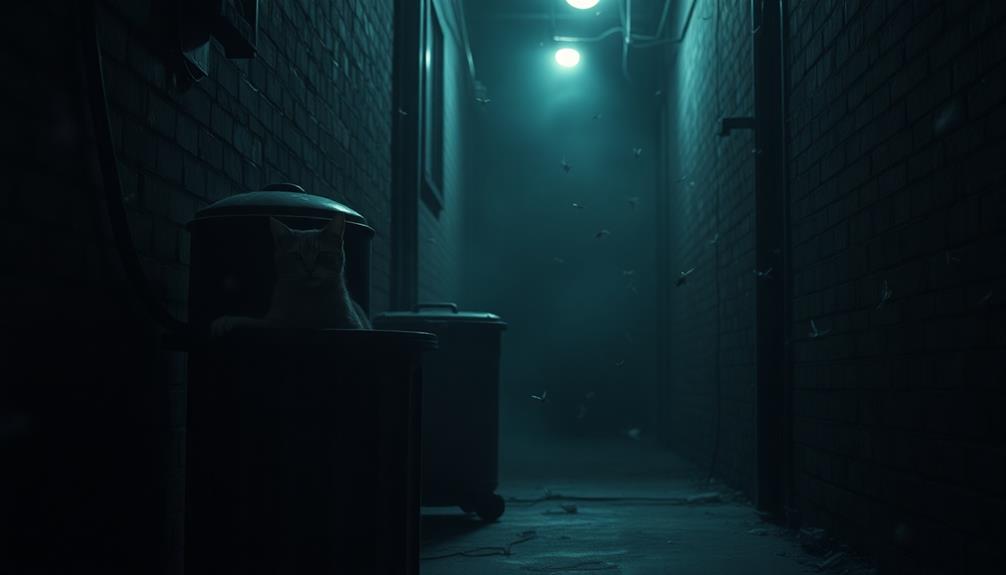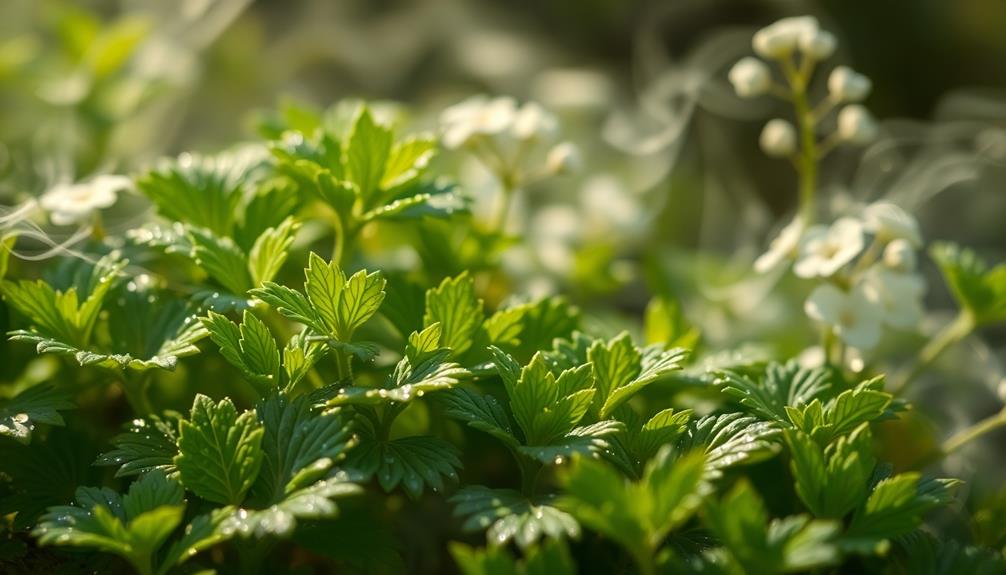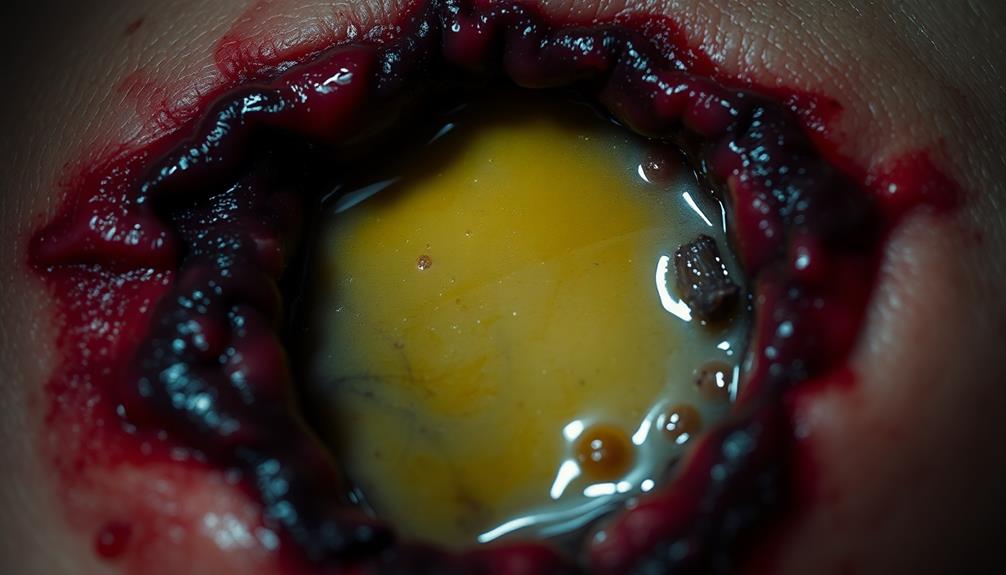Black mold gives off a strong musty smell that most people find unpleasant. It's often compared to damp, dirty socks or rotting wood, which can create a heavy, stale feeling in the air. This odor comes from substances released by the mold as it grows, especially in damp areas like basements and bathrooms. If you notice this smell, it's a sign to pay attention—mold can lead to serious health issues. So, if you're curious about what to do next, stick around and discover some helpful tips for managing mold in your home!
Key Takeaways
- Black mold emits a distinct musty odor, often described as similar to rotting wood or damp, dirty socks.
- The smell is caused by microbial volatile organic compounds (mVOCs) released by the mold.
- This overpowering odor is most prominent in damp areas, such as basements and bathrooms.
- Sensitivity to the musty smell varies among individuals, with some detecting it sooner than others.
- Ignoring the smell can indicate serious health risks, including respiratory issues and allergies.
Introduction
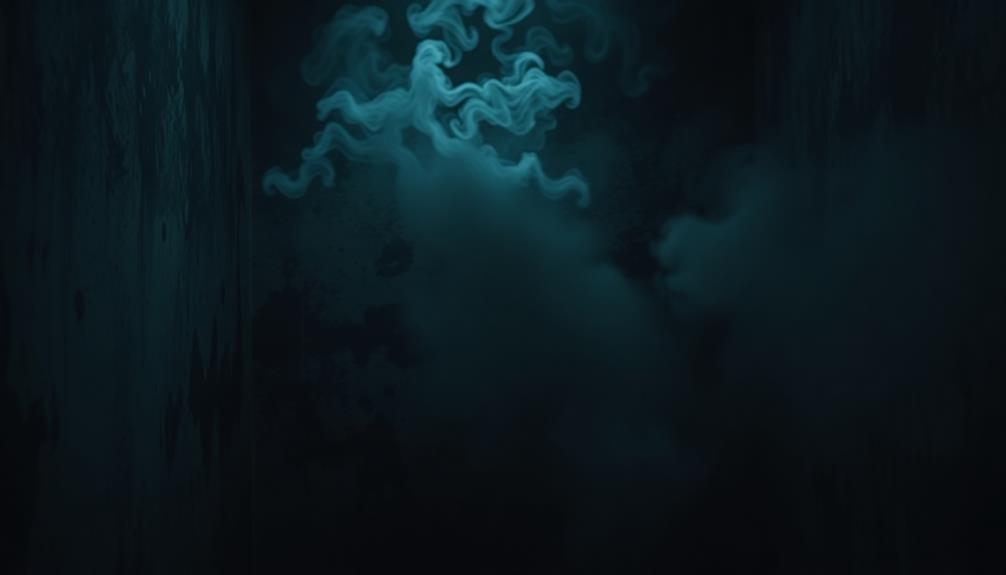
When you walk into a room and catch a whiff of something musty, it's often a sign that black mold might be lurking nearby. This musty smell is usually described as similar to rotting wood or damp, dirty socks. It can be quite unpleasant and is one of the first signs of mold you might notice, often appearing before any visible signs of mold growth.
It's important to act quickly, as mold can spread rapidly in damp environments, making it essential to maintain proper ventilation and moisture control in your home, much like ensuring compliance with wood stove safety standards.
The black mold smell is caused by tiny compounds called microbial volatile organic compounds, or mVOCs, that mold releases as it grows. This means that if you detect that musty odor, it might be time to investigate further.
However, not everyone can smell it right away; some folks are more sensitive to the scent than others.
Ignoring this musty smell can lead to serious mold issues in your home, affecting both your health and safety. So, if you catch a hint of that odor, don't brush it off!
It's always a good idea to check your space for any hidden mold. Being proactive can save you from bigger problems down the road.
Description of the Smell
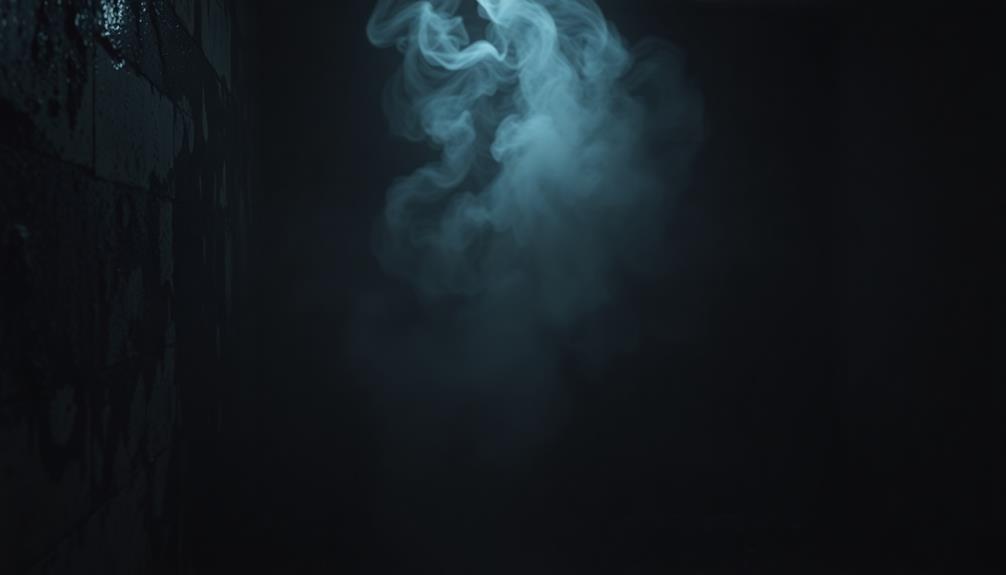
The smell of black mold is unmistakable and can hit you like a wave as you enter a damp room. You might notice a strong, musty odor, often compared to rotting wood or dirty socks. This scent can be so powerful that you'll detect it even before seeing any black mold spores. It's like a warning sign that something's not right in your space!
This unpleasant aroma can also contribute to feelings of fatigue or discomfort, similar to the experience of running dry when exposed to an unhealthy environment.
This distinct smell comes from Microbial Volatile Organic Compounds, or mVOCs, released by the mold. When you breathe in the air filled with these compounds, it can feel heavy and stale, reminding you of a musty attic or an old basement. Some people pick up on this smell right away, while others may take a bit longer to notice it.
Ignoring this musty odor isn't a good idea; it could mean there's a serious mold issue hiding somewhere in your home. If you catch a whiff of that funky smell, it's time to take action! A prompt inspection can help you tackle any mold problems before they become a health risk.
Keep your space fresh and safe!
Source and Composition
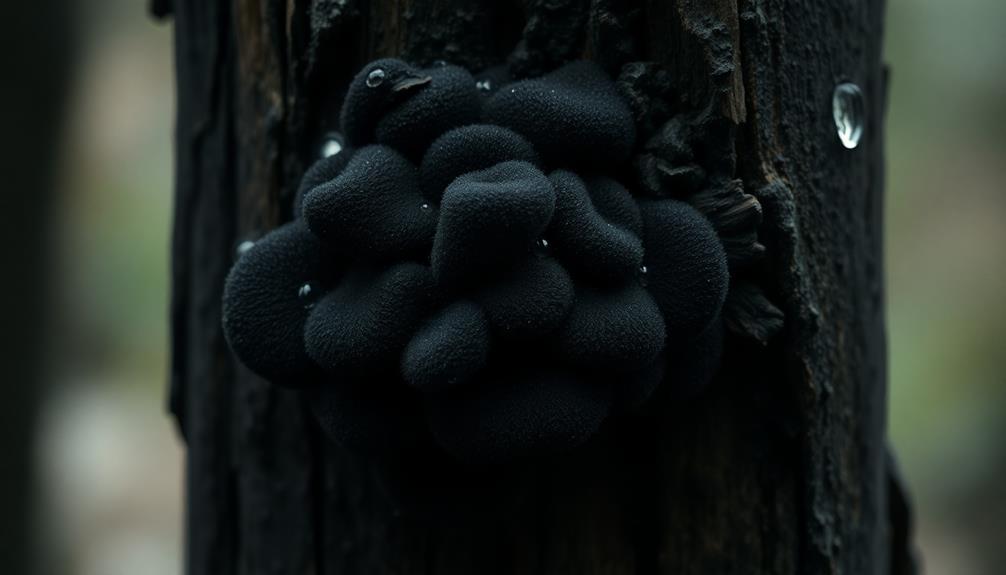
Black mold, scientifically known as Stachybotrys chartarum, thrives in damp environments and feeds on organic materials like wood, drywall, and carpet.
This mold growth creates a unique musty odor that many people describe as reminiscent of rotting wood or damp, dirty socks. It's a smell that's hard to ignore, especially when you're in the same space.
Moreover, the presence of black mold can lead to various health issues, highlighting the importance of addressing mold problems promptly and effectively. The musty odor comes from microbial volatile organic compounds (mVOCs) that black mold releases as it grows, which can be detrimental to your overall health and well-being, as noted in self-care strategies with difficult parents.
If the mold colony is large, you'll likely notice a stronger smell. However, sensitivity to this odor varies; some folks can detect it right away, while others mightn't notice until it gets more intense.
If you catch a whiff of that musty odor, don't brush it off. Ignoring it can mean there's a serious mold issue lurking in your home.
It's crucial to act quickly to prevent any health risks or structural damage. So, keep your nose tuned in! If you smell black mold, it's time to investigate and protect your space, ensuring a safe and healthy environment for you and your loved ones.
Typical Scenarios or Environments

In homes where moisture lingers, you're likely to encounter black mold, especially in areas like basements, bathrooms, and around leaky pipes.
These spaces are often the perfect breeding ground for mold growing, thanks to high humidity and poor ventilation. When you walk into a musty-smelling area, it could signal that black mold is lurking nearby, even before you see any signs of it.
The musty scent resembles the smell of rotting wood or damp, dirty socks, and it's caused by microbial volatile organic compounds (mVOCs) that mold releases.
If you've recently dealt with water damage, keep an eye (and nose) out for this unpleasant odor. Ignoring the musty scent can lead to serious consequences, like health risks and structural damage, as it often indicates significant mold growth in hidden areas.
To keep your home safe, address any moisture issues promptly.
Good ventilation and regular checks in problem areas can help you catch mold before it becomes a bigger issue.
Emotional or Cultural Associations
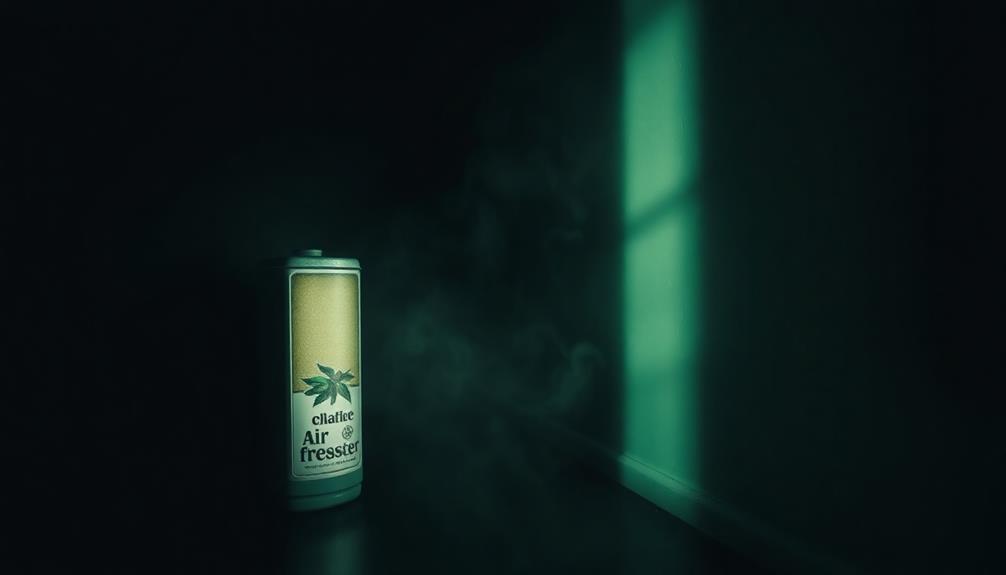
Encountering the musty smell of black mold can stir up more than just concern about your home; it often brings a wave of emotional and cultural associations. The strong, earthy scent might remind you of damp, rotten wood or decaying leaves, evoking feelings of decay and neglect in your living space.
You may feel anxious, as this odor often links to unhealthy living conditions, leading to distress over potential health risks.
In literature and media, moldy environments are frequently depicted as ominous, reinforcing negative feelings about mold's presence in homes. This smell can also trigger personal memories, reminding you of past experiences with flooding or dampness, filling you with discomfort or even loss.
For some, the odor of mold may bring back nostalgia from childhood homes, mixed with worry about health implications for family members. You might find yourself thinking about how those spaces, once familiar, now seem foreboding due to the smell.
Ultimately, the emotional weight of black mold's scent can be heavy, connecting our experiences to deeper feelings about health, safety, and home.
Health or Safety Considerations

The musty smell of black mold isn't just unpleasant; it signals potential health risks that shouldn't be ignored. When you catch a whiff of that strong, musty odor—often likened to rotting wood or damp socks—it's a warning sign. This smell usually means mold is nearby, and you should take it seriously. Inhaling black mold spores can lead to health effects like asthma attacks and allergic reactions.
If you notice a musty odor, don't hesitate to inspect your space for mold growth. Prolonged exposure to this odor can cause even more serious health issues, such as memory loss and feelings of anxiety or depression. Some people are more vulnerable, including children, individuals with respiratory conditions, and those with weakened immune systems.
Taking action quickly can help protect your health and the well-being of your loved ones. If you suspect mold in your home, consider getting help to remove it and improve air quality.
Final Thoughts
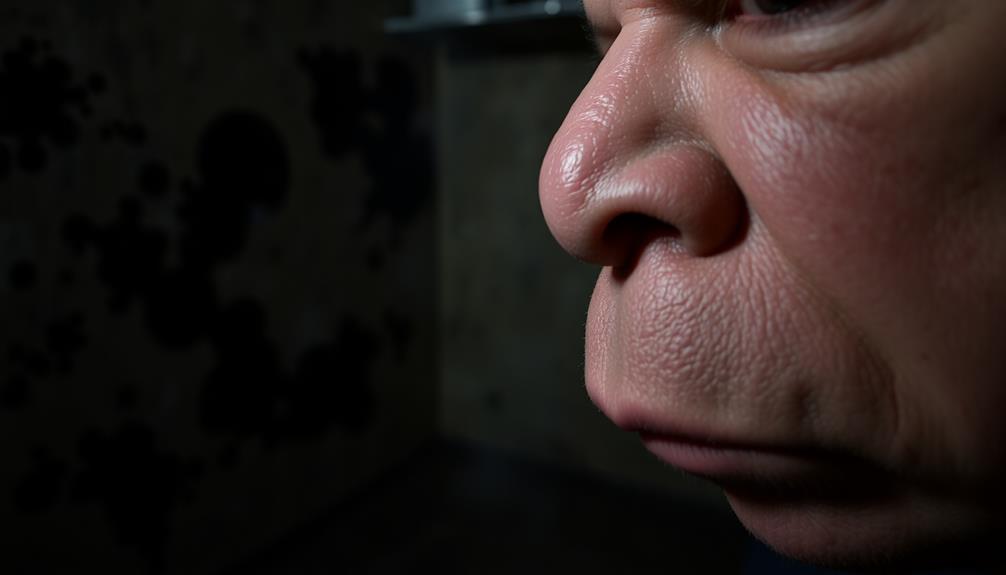
How can you ensure your home remains a safe and healthy environment? First, pay attention to any strange mold odor you notice. If you catch a whiff of something musty, like rotting wood or dirty socks, it might be a sign of a black mold infestation. This smell comes from tiny particles called microbial volatile organic compounds, or mVOCs, which can warn you of hidden mold growing in your home.
Don't ignore that smell! It often means there's moisture lurking somewhere, creating a perfect home for mold. If left unchecked, it can lead to serious health issues, like allergic reactions or respiratory problems. Your nose is your first line of defense, so trust it!
If you detect any mold odor, make sure to inspect your space and address any moisture problems. Call in a professional if needed.
Remember, timely action can save you from bigger headaches down the road. Keeping your home mold-free not only protects your health but also enhances your living space.
Frequently Asked Questions
Is There an Odor to Black Mold?
Yes, there's an odor to black mold. You might notice a strong, musty smell that resembles damp wood or dirty socks. If you detect this odor, it's crucial to investigate further for potential mold growth.
What Are the First Signs of Black Mold?
You'll notice the first signs of black mold as a strong, musty odor, often accompanied by dark spots or fuzzy patches. If you see moisture or water damage, act quickly to prevent further growth.
Is Black Mold Harmful to Breathe In?
Yes, breathing in black mold can be harmful. It can trigger respiratory issues, worsen allergies, and lead to severe health problems over time. If you suspect exposure, it's crucial to address it immediately for your safety.
What Can Be Mistaken for Black Mold?
You might mistake other molds like Aspergillus or Penicillium for black mold due to their similar musty odors. Moisture-damaged materials can also produce foul smells, complicating your ability to identify the specific mold type.

